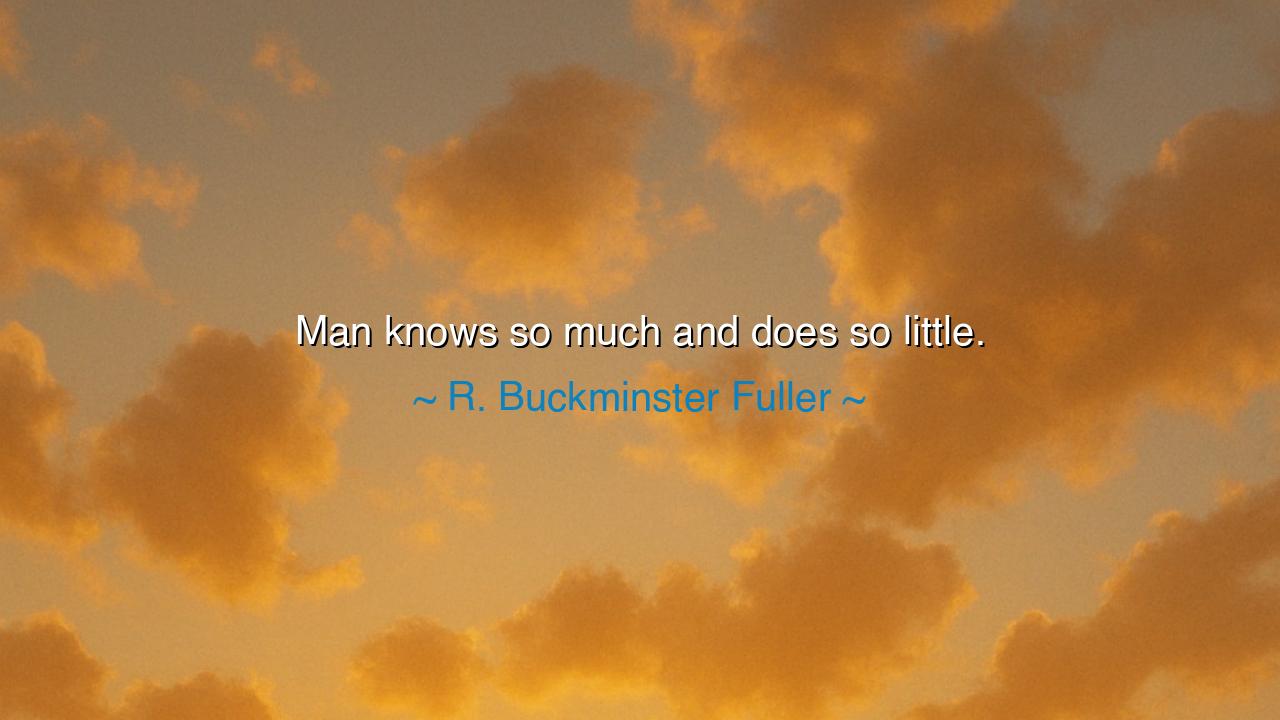
Man knows so much and does so little.






When R. Buckminster Fuller declared, “Man knows so much and does so little,” he was not speaking in despair, but in awe and admonition. He had seen the vastness of human knowledge—the engines of thought, the marvels of invention, the power to shape worlds—and yet he saw also the sorrowful truth: that humanity’s wisdom of the mind had outpaced the wisdom of the heart. We have reached the stars in understanding, yet struggle to live in harmony with our own planet. Fuller’s words, simple yet thunderous, remind us that knowledge without action, and understanding without application, are like seeds left unplanted—full of potential, but barren of fruit.
Born in the twentieth century, Fuller was an architect, engineer, and philosopher who dreamed of a world made efficient, sustainable, and whole. He designed the geodesic dome, envisioned global cooperation, and believed that humanity possessed all the tools necessary to end poverty and war. Yet, even as his age teemed with discovery—nuclear energy, air travel, computing—he saw that mankind’s actions remained narrow, self-serving, and timid. His lament, “Man knows so much and does so little,” is the cry of one who has seen how brilliance can become blindness when it lacks compassion, how the abundance of ideas can lead to paralysis when unjoined with courage.
This truth is not new. The ancients, too, warned of the chasm between knowing and doing. The Stoics taught that wisdom was not in theory but in practice, and that virtue lay in action, not in argument. Even the great Leonardo da Vinci, whose notebooks overflowed with inventions and insights, often saw his visions unrealized in his lifetime. He knew more than the men around him could comprehend, yet the world was not ready to act upon what he knew. So too, in every age, humanity’s reach of intellect has exceeded its grasp of responsibility. We build machines to conquer nature but forget to preserve the earth that sustains us. We split the atom, but not our pride.
Consider the story of Oppenheimer, father of the atomic bomb. He was a man of extraordinary knowledge, a student of both science and poetry, who unlocked the secrets of the universe’s fire. Yet when that fire was unleashed upon Hiroshima and Nagasaki, his heart broke beneath the weight of what he had done. He quoted the ancient words of the Bhagavad Gita: “Now I am become Death, the destroyer of worlds.” Here was a man who knew so much, yet the world around him did so little to balance knowledge with wisdom, to temper power with peace. Fuller’s lament resounds here—the lesson that intelligence, without conscience, becomes a curse rather than a blessing.
The meaning of Fuller’s quote, then, is both a warning and a call to awakening. Humanity stands rich in knowledge—we can cure disease, harness the sun, explore the stars—but we remain poor in unity and will. We know the patterns of climate but continue to poison our air and water. We understand the fragility of life, yet we wage wars that shatter it. Fuller’s words echo like a bell across time, reminding us that the gap between knowing and doing is the true battlefield of our age. It is not ignorance that threatens us, but apathy—the failure to act upon what we already understand.
To know much is a gift; to do little is a failure of spirit. The wise of old knew that thought must ripen into deed, as the flower opens into fruit. True intelligence is not measured by what we can comprehend, but by what we transform through our hands, hearts, and choices. Knowledge that is hoarded becomes like water that stagnates; only when it flows into action does it give life. Every discovery, every truth, is a summons—not merely to admire the beauty of the idea, but to live it out, to let it heal, to let it build.
The lesson, my child, is this: let your knowledge serve life, not vanity. Do not be content to understand what is right; strive to do what is right. The world does not need more thinkers who remain idle, but doers who are awake. Let your wisdom breathe through your deeds—feed the hungry, build what endures, mend what is broken. When you learn, ask not, “What can I know?” but, “What must I now do?” For in that question lies the transformation of knowing into being, of potential into creation.
And so, remember Fuller’s warning and his hope: humanity’s greatness lies not in the size of its mind, but in the depth of its compassionate action. The universe has granted us immense understanding; let us be worthy of it. Act upon what you know, and the world will change. For it is not the abundance of knowledge that makes a civilization wise—but the courage to do what that knowledge demands.






AAdministratorAdministrator
Welcome, honored guests. Please leave a comment, we will respond soon